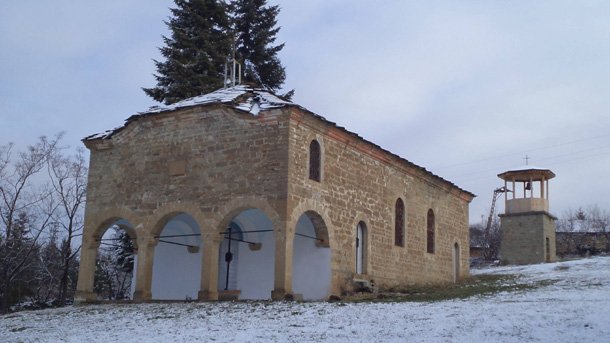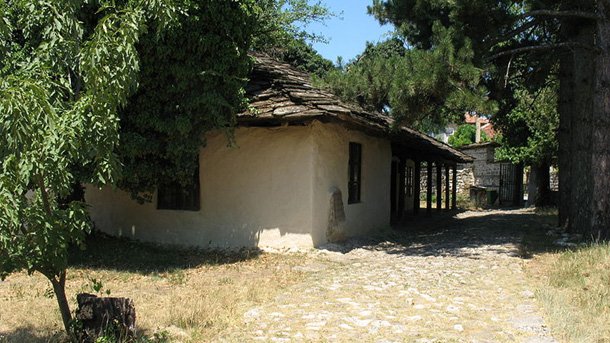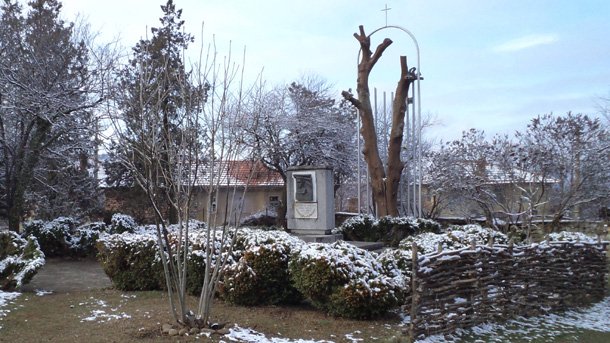Kakrina is a small village situated in Central Bulgaria, near the town of Lovech. The Bulgarians associate this village with the tragic historic fact about the capture of the most beloved national hero Vasil Levski who created a network of revolutionary committees which had to liberate Bulgaria from the Ottoman Yoke. Levski was hung on February 19, 1873 near Sofia. Each year on the day of the doom of the Bulgarian Apostle of freedom, Bulgaria goes back to its past and bows before the memory of this great Bulgarian who, before he was hung said:” Everything I have done is to the benefit of the society”. The area in front of the small inn in the Village of Kukrina, where Vasil Levski was captured by the Turks, turned into a holy place for all Bulgarians and will be such for the centuries to come.
Today, the village of Kakrina lives in the pace of the 21st century. It lies in the southwestern part of the Devetashko table-land which is the place with the biggest cave complexes in Bulgaria, says the deputy mayor of the village Ivanichka Stancheva:
“If we leave from the municipal centre Lovech and head east along the old road connecting the towns of Lovech and Sevlievo, some 18 kilometers away we will find ourselves in the pretty village of Kakrina”, says Mrs Stancheva. “Cool and fresh air, healthy herbs and many places for recreation and holiday is what this region offers to the tourists. The area is rich in caves, forests, hills, wild birds and animals. Each person who loves nature can see here species such as pheasant, partridge, quail, wild ducks, turtle-dove, wild boar and deer. The rare black storks also live on the land of our village, in Paskalevec locality.”

© Photo: archive Kakrina
Legends have it that the village was founded 400 years ago. At that time it lied some 3 kilometers east of the present village of Kakrina. The constant attacks of Turkish soldiers who were passing along the road between Lovech and Sevlievo forced its population to leave the village. They split in two- the first half settled in today’s village of Brastovo and the other half decided to live near a water spring which gave the name of the present village of Kakrina. Its name came form the frog sound which was coming from the small ponds near this place, Ivanichka Stancheva says, reminding this interesting fact. The fate of this village is no different to the one of most Bulgarian villages which went through the 20 year transition period after the democratic changes in 1989. There are hardly any young people there and the population, amounting to 270 people, consists mainly of middle aged or elderly ones. Two agricultural companies cultivate the land near the village. There is also a company which produces dried herbs. There are also 3 dairy farms, where sheep and cows are bred. The place is famous with its beautiful nature and clean air even in Spain. Fifteen houses in this village were bought by Spanish citizens who often come here for a holiday. Some of them rent their houses to people who do eco-tourism and the village has turned into a starting point for traveling in this area. It is one of the 10 villages from the Devetashko plateau that leads to the famous Krushunski Waterfalls.

© Photo: wikipedia.org
Kakrina is permanently linked with the Bulgarian history and takes us back in time, says Ivanichka Stancheva. Its population took active part in the liberation wars against the Ottoman conquerors. Some of the closest brothers-in-arms of Vasil Levski lived in this village. One of them was Hristo Tsonev-Latinetsa who rented the small inn in this village at the request of Levski. Thus, all meetings of the local revolutionary committee were held there.
“The Kakrina Inn was the last shelter of the Bulgarian Apostle of freedom Vasil Levski who was captured by the Turkish army on December 27, 1872”, says Ivanichka Stancheva. After his capture the inn was abandoned and was later burnt to the ground by a massive fire. However, some true Bulgarians built a memorial tablet on this place in 1901. In 1924 the Vasil Levski Civil Committee started a campaign for raising funds and collecting materials for the restoration of the Kakrina Inn. Its foundations were laid in 1926 and its official opening was held on May 10, 1931. In the museum yard, right next to the fence where Levski was captured, a monument was built. A century-old elm-tree, which is the only witness of the capture of Vasil Lavski, also grows there. In 1997 the tree was badly hurt by a massive storm, but was later strengthened in 1998 and serves as a pedestal now."

© Photo: archive Kakrina
The fence, where Vasil Levski was captured in his attempt to escape from the Turkish zaptieh, is being changed every few years. There is also a bas-relief of Vasil Levski in the Inn yard. In 2011 a bas-relief of Levski’s biggest friend and associate Hristo Ivanov was placed on the wall of the Kakrina Inn, says Ivanichka Stancheva. The citizens of Kakrina are proud of the fact that 7 people of this village were once members of the Lovech Revolutionary Committee. In 2013 Bulgaria marks the 140th death anniversary of the Bulgarian Apostle of freedom. The village of Kakrina as always met people who view the homage paid to Vasil Levski as an opportunity to realize what they could give to Bulgaria as citizens and how they would like to see this country in the future.
English version: Kostadin Atanasov
Priest Lyubomir Bratoev is a direct participant in the events of t he founding of the Bulgarian Orthodox Church community in Berlin . He came to the capital of East Germany in the late 1980s as a doctoral student. And, like a typical Orthodox Christian..
After nearly 35 years, the Bulgarian Orthodox Church Community in London has its own church in the central part of the British capital, in close proximity to the Bulgarian Embassy. There, in the prestigious Kensington district, next to Hyde Park and..
Meatfare Sunday in 2025 will be remembered as a major celebration for the Bulgarian Orthodox Church and the entire Bulgarian community in the United Kingdom. The "St. John of Rila" Orthodox Church, built with funds from the Bulgarian state and with..
After nearly 35 years, the Bulgarian Orthodox Church Community in London has its own church in the central part of the British capital, in close proximity..
Priest Lyubomir Bratoev is a direct participant in the events of t he founding of the Bulgarian Orthodox Church community in Berlin . He came to the..

+359 2 9336 661
